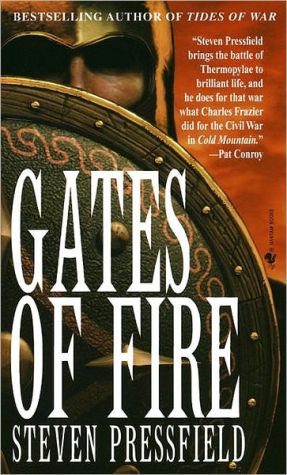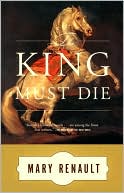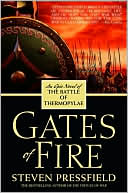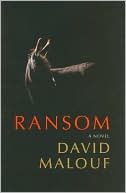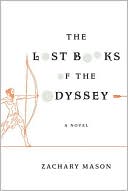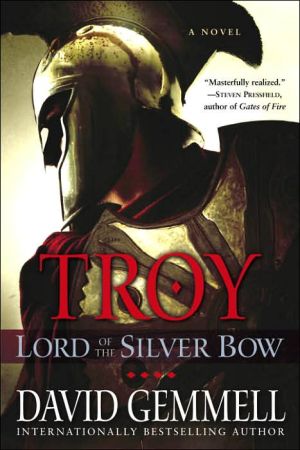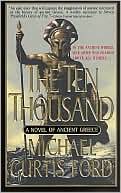The Songs of the Kings
"Pure gold....One of the best books by this most versatile of writers."—Penelope Lively\ "Troy meant one thing only to the men gathered here, as it did to their commanders. Troy was a dream of wealth; and if the wind continued the dream would crumble." As the harsh wind holds the Greek fleet trapped in the straits at Aulis, frustration and political impotence turn into a desire for the blood of a young and innocent woman—blood that will appease the gods and allow the troops to set sail. And...
Search in google:
"Pure gold....One of the best books by this most versatile of writers."—Penelope LivelyThe New YorkerA stubborn wind from the northeast ushers in rough times for the House of Atreus, and the Greek ships, en route to Troy, remain trapped in the straits at Aulis. Unsworth's retelling of the story, familiar from Euripides, of the sacrifice of Iphigeneia to appease the gods so that the boats can sail is a bold, modern tale with cynical riffs on the themes of duty and power, truth and fiction. His Greek warriors are schemers and media-savvy self-promoters who are desperate to look good in the sung reports that are their equivalent of the news media -- songs that are, we realize, the seeds of the Homeric tradition. As Odysseus says, "Once things get into the Song you will never entirely succeed in getting them out again."
This was the sixth night. He had lain awake through most of it, listening to the wind, the body of the sleeping boy beside him, beset by fear at still not knowing the sender, fear of other failures that might follow from this. The strands of the wind he knew by this time; tensed in concentration, he imagined he could hold them apart, the shrilling high up among the bare rocks, the softer combing in the shrub lower down, the ripple of loose canvas from the tents. Even the very smallest sounds he strained to hear, random sobs and whispers, stirring of grasses, the faint scrape of displaced pebbles along the shore. A wind from the northeast, unheard of at this season, keeping the fleet trapped in these straits at Aulis, and the army with it, waking the men every morning to the unhappy knowledge of some god's displeasure. It came from the direction of Troy, where lay their dreams of conquest. Six days and six nights with no sign of relenting, though the voices varied. The wind itself seemed to suffer in all its moods, even in its rages pleading to be quieted, to be soothed.\ \ Then, early in the morning of the seventh day, came the summons from Agamemnon. He noted the time just as in those days of his power he noted all such things. Just before sunrise, the wind still there but quieter now, as if for the while exhausted after its riots in the dark. A time disputed between Hecate and Helius, when the world is between states. He was between states himself, as he also noted: neither inside the tent nor out of it, but cross-legged on a cushion at the threshold, watching his acolyte Poimenos, who was still half asleep, fumbling together a fire for the infusion of mint and honey he had been schooled to prepare. And he was neither clothed nor naked, being dressed only in a loincloth, with a piece of cotton over his shoulder as a shawl. These were things important to remember and interpret; not mortals but gods chose the times.\ \ It was the chief scribe Chasimenos that brought the message, approaching from the rear, appearing suddenly, flanked by soldiers from the King's Guard. At midday, after the fight, Agamemnon would require the presence in his tent of Kalunas, I beg your pardon, Calchas, priest of Apollo.\ \ He smiled saying this, glancing away with eyes so pale as to seem almost colorless in the narrow, bearded face. Calchas read the usual veiled contempt in voice and smile, the elaborate politeness, the stress upon the name, not his own, bestowed on him by the Greeks. Contempt too for his shaven face, his plaited hair, the smudges of kohl that would be still on his eyelids, the amulets worn as a bracelet, contrary to Greek custom. Asian priest of an Asian god without even a cult center yet established here.\ \ All this was in the looks and the words--Calchas was practiced in reading such marks. But there was also the fact that this upstart diviner had been granted a shelter of canvas when most of the army spent the nights in the open, finding what cover they could; that he had a boy to share his tent and see to his needs; that he slept on a woolen mat, thickly woven; that he need not reply promptly to a messenger, even one of high rank. It was common knowledge that the King would make no decision, take no step, before Calchas had first scanned the auguries.\ \ Chasimenos stood there waiting in his long-sleeved tunic of a palace bureaucrat. His smile had withered at the delay. "The King requires the presence of his seer," he repeated. The soldiers stood on either side of him, their long spears grounded, their faces heavy with ill humor at being given escort duties at such an hour, not much after dawn. It was early for the King to send; he would have had another bad night. Chasimenos had no need of an escort for such a small thing as this. But the habit of armed guards had grown in the days they had been there, waiting on the wind. Agamemnon himself never appeared without at least six. The diviner said, "Calchas will be honored beyond honor to kneel at the King's feet. May he live forever."\ \ As he spoke he heard the small crackle of the fire, saw the smoke rise straight up in a thin plume. He felt a slight shudder within him, premonition of ill. These calms were dangerous, always brief, cheating the army with hope. There was some quality of danger too in this dawn summons to a meeting he had not been consulted about. Nothing of this showed on his face. He had known how to wait before answering, just as he knew now how to appear unaffected.\ \ He had expected, the answer once given, that the other would quit his presence immediately--it was one he had never shown signs of liking, not even back in Mycenae, before they had set out. But Chasimenos remained there, and after a moment, in a tone he tried to make friendlier, said, "Which of them do you think will win?"\ \ Now at last Calchas could permit himself to show some slight surprise. He was being solicited for an opinion as to who would live and who would die that morning, Stimon the Locrian or Opilmenos the Boeotian, due to fight a duel later on as champions of their respective tribes. "I have no ideas on the matter," he said, which was untrue.\ \ "Opilmenos is the stronger and has more battle experience, but they say this Locrian is very quick."\ \ Something in the tone of this suggested that the scribe might have a stake in the outcome. Calchas had heard from Poimenos, who came and went about the camp on various kinds of foraging expeditions, gathering gossip on the way, that the men were wagering on the result. Though what they could have to wager it was hard to see, they possessed nothing but their weapons.\ \ Chasimenos was lingering still. "I thought that the god might have made it known to you," he said.\ \ Calchas shook his head. "What does Lord Apollo care for the quarrels of men? Live or die, what concern is it of his? The gods will view the outcome with complete and serene indifference unless there is some offense we know nothing of, something done or left undone, said or left unsaid, which might weigh against the one or the other man when it comes to the meeting. It is dangerous to neglect a god, even when not knowing. Punishment can arrive before knowledge."\ \ He spoke carefully, knowing the other for an enemy who would destroy him if he had the power. He had been given a sign as to who would be the victor, but it would have been unwise to talk to Chasimenos about this, as it had been of an unusual kind and he had mentioned it to no one. The outcome of the fight was of course the only thing Chasimenos couldn't organize. He was a gifted and devoted administrator, meticulous to the point of obsession, which was why he held his\ \ senior position in the palace hierarchy. He had been busy with this fight from the moment Agamemnon had given his approval of it, working out in close detail the order of assembly, the precise positions to be occupied by the allied forces when they lined up for the spectacle. A real headache that, Calchas thought, to remember all the quarrels, some of them ancient, keep feuding tribes at a safe distance from one another. But the outcome he couldn't fix. No one is bribed to lose in a fight to the death . . . "This wind that plagues us is an example," he said. "The punishment has come before the knowledge of the fault."\ \ As if in support of him, the wind rose again now in a long gust that scattered the smoke and rattled the canvas of the tents throughout the camp like a fury of drums. One of the guards clutched at his helmet.\ \ Disappointed at not getting the tip he had obviously been hoping for, Chasimenos reverted to his former aloof and slightly sneering manner. "Croton wouldn't agree with you. He maintains that Zeus cares what happens to every single one of us."\ \ "Yes, I know Croton says that, he says we are the children of Zeus." Calchas paused, again conscious of the need for caution. Zeus was the father-god of the Greeks and Croton was the priest of Zeus, with a large following in the army. He and his two disciples paraded frequently through the camp proclaiming the power of their god. "Zeus is lord of all," he said. "But how can we be children of the gods when we are made of different stuff, when we are perishable and they are not? It isn't logical. We have one season only but the gods live forever. Of course, there is shelter in the thought of a father, and shelter is needed."\ \ He was beginning to enlarge on this theme, which he had suddenly found interesting, the relation between the need and the thing needed, which thing existed at first only because of that need, but then, because of that need, took on true existence. "Perhaps it works the other way too," he said. "Perhaps we humans only exist because the gods need us."\ \ But Chasimenos said nothing to this and did not stay to listen to more, turning abruptly on his heel and disappearing round the side of the tent. However, there was comedy in this that made up for the rudeness; the guards were taken quite by surprise and had to go lumbering after him, hoisting their spears awkwardly. Measured movement, a certain stateliness, were necessary for a person under escort; but Chasimenos, used to scuttling down palace corridors with no company but his own intriguing mind, had yet to learn this. A mistake in any case to talk much at all to him. Themes commonly discussed in Apasas, city of the diviner's birth, and the lands of the Hatti from Kadesh to Sardis, were too abstract for these gross Mycenaean minds. Even a scribe, he thought, a representative of their intellectual class. Chasimenos was hostile enough without having claims made on his intelligence which his intelligence was not able to meet.\ \ He stayed where he was while the light strengthened. After a while Poimenos brought his drink and a wheat cake to go with it. They were in wheat country there, with fertile land to the south; and now, at the end of August, the harvest was in, though the troops had to go farther afield every day in search of full granaries--it was known now that the country people were hiding their grain. Unpatriotic scum, in the words of Menelaus. Since losing his beautiful Helen to Paris--that swine of an Asian, as he called him--Menelaus spoke often of patriotism and solidarity.\ \ As Calchas ate and drank, the first darts of the sun struck through the canvas of the tent behind him, warming the odors of night still caught there in that narrow space, oxhide, crushed grass, the faint scent of bodies in the folds of the wool. Before his face was the radiant sky, a few bright curls of cloud low on the horizon, moving slowly, barely perceptibly--this wind did not change the sky, did not bring storms. He watched the clouds drift together, looked for a shape in them. A fleece, a swan's neck, the forepart of a chariot. He strove to empty his mind for the message, but he could read nothing there, they were random shapes; and he felt a constriction of the heart at this further failure, knowing that nothing in the world was random. There had been no sign for him in clouds or embers or the flight of birds, not one, in all these days at Aulis, when signs were so desperately needed, when Agamemnon waited for his words, when all the camp waited to know who was sending the wind that kept them huddled there along the shore, a thousand men, the greatest army ever assembled by the Greeks in alliance, trapped there while the useless ships rocked at anchor and the waves mocked them and slapped their hulls. In these sheltered waters, with the hills of Euboea making a barrier, the wind had a varying breath, sometimes deep-voiced, sometimes screaming, sometimes, as now, derisively gentle, hardly more than a breeze; but once round the promontories, when you were facing the open sea, the wind was a flail of terrible power, beating ships back, smashing them on the rocks.\ \ He could see the masts from the rise where he was sitting. That August sky was so fiercely bright, they glowed as they swayed as if stirred in their own fire. Smoke was rising everywhere now, swirled by the wind, shot through with sunshine. There were voices and movements of men lower down towards the shore, where the main body of the army was encamped.\ \ With the warmth, the pervasive smell of human excrement grew stronger. On the third day, Ajax of Salamis, called Ajax the Larger, who thought of himself as a practical fellow, had organized his people to dig a long trench for a latrine--a heavy job in the hard ground of the hillside. The whole force from Salamis had been employed on this, laboring in shifts. It kept them busy, an added advantage, as Ajax remarked to his small friend and namesake, Ajax the Locrian, called Ajax the Lesser. Mischief was bred by idleness; working together for a common purpose was good for morale. You form them into squads, appoint a few overseers, tell them you'll tan their hides if there is any slacking, and there you are. Unfortunately, however, in his enthusiasm for the project, Ajax had temporarily forgotten why they had all been obliged to wait there in the first place, and sited the latrine to windward of the camp. Being obstinate in the extreme, he would not admit his mistake, and now forced all the contingent from Salamis to continue using the latrine on pain of his severe displeasure--and all knew what that meant--if found defecating anywhere else. It was generally agreed that the people of Salamis had not been the luckiest contingent so far. Meanwhile the smell was getting worse. People grumbled, but in the general apathy that had fallen over the camp no one was ready yet to face the violent encounter with the enormous Ajax that any direct protest was certain to bring about.\ \ Thinking of this brought back to Calchas's mind thoughts of the fight that was soon to take place. He believed he knew who would win it. He had been given a sign, not because the gods were interested in the outcome, but because their power pervaded human life, like this fire that glowed on the masts without consuming them.
\ The GuardianIntellectually agile, thrillingly stylish...The Songs of the Kings effortlessly proves that modern life is the stuff of ancient myth.\ \ \ \ \ The IndependentA beautifully measured entertainment given gravity by how accurately it reflects the present political zeal to control the media.\ \ \ The Times [London]Unsworth's story never falters.\ \ \ \ \ The ListBrilliantly told. This short, sharp tale deserves to be on the shelves of revisionists and purists alike.\ \ \ \ \ New York Times Book ReviewDetail so precise you can almost smell the cook fires....Almost magical capacity for literary time travel.— Neil Gordon\ \ \ \ \ New York TimesIncandescent....One of the three most important British novelists at work today....It is impossible to read [this novel] without feeling an immediacy both unbearable and profound, as if this week's headlines were being incised into the conscience and the heart....Unsworth has combined several versions of the Iphigenia myth to set up an entrancing, frightening mystery.— Richard Eder\ \ \ \ \ The Washington PostBarry Unsworth uses history as a touchstone in most of his 14 novels. Sacred Hunger, for which he won the Booker Prize, concerned the 18th-century Atlantic slave trade; others, such as Losing Nelson, take place in the present day but concern historical legacies. Songs of the Kings is the first to use legend as a setting. Yet Unsworth is no slacker when it comes to contemporary classical historiography, showing the influence of "history from the bottom up," feminism and Edward Said's Orientalism, as does much of the field nowadays. Two of Unsworth's main characters are outsiders: Calchas and a female slave who attends Iphigeneia. Both were born in "Asia" (modern-day Turkey), and, like Kunta Kinte, a slave from a different era, they remember the names they had before their Greek masters changed them. They are, in fact, the only two sympathetic major characters; the Greeks are bearded provincials, even outright racists. — Allison Xantha Miller\ \ \ \ \ The New YorkerA stubborn wind from the northeast ushers in rough times for the House of Atreus, and the Greek ships, en route to Troy, remain trapped in the straits at Aulis. Unsworth's retelling of the story, familiar from Euripides, of the sacrifice of Iphigeneia to appease the gods so that the boats can sail is a bold, modern tale with cynical riffs on the themes of duty and power, truth and fiction. His Greek warriors are schemers and media-savvy self-promoters who are desperate to look good in the sung reports that are their equivalent of the news media -- songs that are, we realize, the seeds of the Homeric tradition. As Odysseus says, "Once things get into the Song you will never entirely succeed in getting them out again."\ \ \ \ \ The New York TimesBarry Unsworth has fashioned an incandescent novel. It works on two levels: in part a desolate myth told with the fate-drunk lurch of Greek drama, in part a mordant contemporary satire on the unequal struggle between humanity and its corruption through the ends and means of war and power. — Richard Eder\ \ \ \ \ Tom LeClairTo placate Zeus and get the Trojan War under way, the leader of the Greeks, King Agamemnon, was asked by his fellow kings to sacrifice his teenage daughter, Iphigeneia. Unsworth's retelling of that mythic story wittily demonizes epic heroes Achilles (a stupid narcissist and Odysseus (a lying nobody while humanizing minor players and inventing others. The author of the Booker Prize–winning novel Sacred Hunger persuasively imagines the interior lives of his Greek characters, including that of Iphigeneia, as he focuses the plot around arguments for and against her sacrifice. Because Iphigeneia escaped death in some of the myths, this novel maintains page-turning suspense right to the end. While Unsworth makes the novel accessible to anyone, readers with some knowledge of Greek mythology will particularly appreciate its subtleties.\ \ \ \ \ Publishers WeeklyProvocative and subversive, Unsworth's new novel rewrites ancient history to show how a wily, ambitious and power-hungry man can distort the truth, convince the masses to support him and incite his country to wage war. It's an audacious blending of myth with sharp contemporary resonance. The setting is Aulis in 1260 B.C., where unfavorable winds are keeping the fleet of the Greek expeditionary force (actually a motley assemblage of hostile and predatory tribes loosely united under Agamemnon) from setting out to capture Troy. The pretext is revenge for the "rape" of Helen by Paris, but Agamemnon and such tribal leaders as Achilles and Odysseus are, in fact, lusting for the fabled treasures of Troy, spoils of war that each man, down to the most common soldier, yearns to possess. Unsworth (Sacred Hunger) reveals this complex intrigue slowly as he explores the critical situation on which the narrative hinges: the omens that explain Zeus's wrath and the prophecy that only the sacrifice of Agamemnon's daughter, Iphigeneia, will reverse the contrary winds. We know of this event from Homer, of course, and he appears here as the Singer, a far from noble figure who is influenced by the conspirators to fashion the version fed to him by Odysseus. It is the hero of The Odyssey who gradually emerges as the chief villain, cynically manipulating his cohorts as he exploits the prophecy to serve his own ends. And it is Iphigeneia, lured to Aulis by false promises, who shows more moral courage than the king, his enemies or any of the court sycophants who seek only their own advantage. Unsworth's narrative method is as daring as his message; his prose is a mixture of classic cadences and contemporary vernacular, animated by beautifully descriptive vignettes and bawdy humor. He uses a minor figure, Calchas the diviner, as the means through which the reader understands the political machinations that create the illusion of a just war. "People intent on war always need a story, and the singers always provide one.... What [this] is really about is gold and copper and cinnamon and jade and slaves and timber," Calchas says. "It is the stories told by the strong, the songs of kings, that are believed in the end." (Mar.) Forecast: While some readers may be uncomfortable with the use of contemporary expressions in a classic context, the timeliness of this novel should assure wide coverage and critical applause. Copyright 2003 Reed Business Information.\ \ \ \ \ The Guardian... intellectually agile, thrillingly stylish ... The Songs of the Kings effortlessly proves that modern life is the stuff of ancient myth.\ \ \ \ \ The IndependentThe Songs of the Kings is a beautifully measured entertainment given gravity by how accurately it reflects the present political zeal to control the media.\ \ \ \ \ The London TimesUnsworth's story never falters...\ \ \ \ \ The List... brilliantly told. This short, sharp tale deserves to be on the shelves of revisionists and purists alike.\ \ \ \ \ Kirkus ReviewsThe world of Homeric epic and Euripidean tragedy is brought sharply to life in British master Unsworth’s gorgeously detailed, astute 14th novel. An old story: Greek King Agamemnon agrees to a plan to sacrifice his daughter Iphigenia, a priestess of Artemis, to the goddess’s enemy Zeus, thereby reconciling the deities, and providing favorable winds that will enable Agamemnon’s ships to proceed across the Aegean Sea and wage war on Troy. Unsworth’s cleverly paced retelling focuses on key figures among the Greek militants: the indecisive, suggestible monarch; narcissistic, short-fused Achilles; senile elder Nestor (who had "lost his marbles long ago"); slow-witted extrovert Ajax; and especially crafty power politician Odysseus, whose sinister manipulations of his sovereign include persuading their army’s Blind Singer to insert propaganda messages into his lyrics. The latter’s frequent fatalistic interpolations acknowledge the harsh reality that "it is the stories told by the strong, the songs of the kings, that are believed in the end." As events thus march toward their predetermined end, the ironies multiply—for, even though the winds have shifted without benefit of divine intervention, Odysseus reasons persuasively that the anticipated spectacle of the princess’s death should not be withheld from the troops, who must be kept together. This subtly fashioned tale compares favorably with Robert Graves’s classically based historical fiction (I, Claudius, etc.), though even readers amused by implied parallels to a potential US invasion of Iraq may raise eyebrows at Unsworth’s profligate use of contemporary slang and Orwellian doublespeak (for example, Odysseus’s warnings that Agamemnonmust not be "marginalized" and that Iphigenia needs to be "incentivized"): at odd moments, there’s a Wag the Dog-like waggishness about it all. Nevertheless, a distinguished companion to such glorious excursions into the past as Sacred Hunger (1992) and Losing Nelson (1999).\ \

